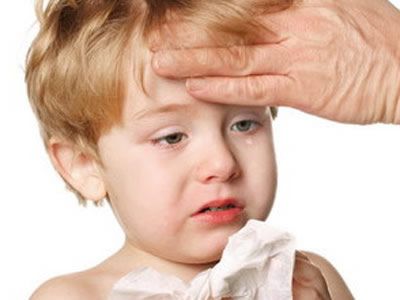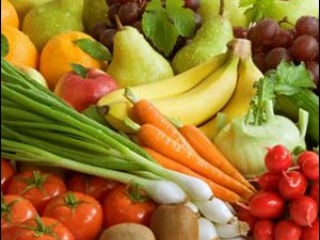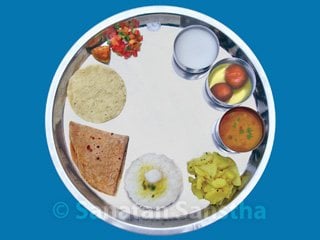Contents [hide]
- 1. Elements that cause diseases during rainy season
- 2. Diet appropriate for rainy season
- 3. Special precaution to be taken during rainy season
- 4. Natural remedies to thwart away houseflies and mosquitoes
- 5. Effective way to prevent ailments in rainy season
- 6. Rules to be observed with respect to meals
- 7. Precautions to be taken in the rainy season during the days of dry spell accompanied with bright sunshine
1. Elements that cause diseases during rainy season

Prior to onset of the rainy season, our body gets in a dehydrated condition internally during the summer season and it gets enervated. There is a sudden change in the environmental condition as the hot sunny weather transitions into cold and wet weather as the rain commences. Humidity in the air also increases. This change disturbs the balance of Vata (Gas) in our body. Also since the acidic nature in the entire ecosystem, especially in the vegetation, grains, water etc. increases, the tendency of our body to absorb and accumulate acidity from them also increases. During these days, our digestive system also weakens. Reduction in appetite causes indigestion related disorders. Drinking water gets contaminated due to dust and garbage that flows in to it along with the rain water and this also invites diseases. All of the above factors collectively cause disorders due to imbalance of Vata such as arthritis and indigestion related problems like loose motion.
2. Diet appropriate for rainy season
A. What should one eat during rainy season and what should one avoid eating?
| Can consume | Avoid consuming | |
|---|---|---|
| 1. Taste of the food | Mildly sour-salty, bitter, astringent and pungent | Over sweet |
| 2. Attributes of the food items | Easy to digest, energetic, dry and slightly fatty | Liquid |
| 3. Related to Vata, Pitta (Bile), Kapha (Phlegm) | Old grains (rice, wheat, barley, finger millet, sawa millet, kodru, millet), flour made from roasted grains and pulses, amaranth grain, popped grains | New grains, puffed rice, puffed maize |
| 5. Cereals | A. In large quantity : Green gram, Red lentil
B. In small quantity : Horse gram – Horse grain, Black gram |
Cow pea, peas, field beans or hyacinth beans or lablab
Mat bean or moth bean |
| 6. Vegetables | A. As per need : Bottle gourd, Okra, Snake gourd, Cabbage, Cauliflower, Indian round gourd, Shravan Ghevada, Cluster bean, Elephant’s foot/yam, Red amaranthus, Val.
B. In small quantity: Fenugreek, Mustard |
Leafy vegetables |
| 7. Spices | All types of spices | |
| 8. Oil and oil seeds | Sesame oil, Groundnut oil | |
| 9. Food items | A. Millet bhakari (Bharatiya bread), Sanja made up of Sorghum or puffed Sorghum (it would be good to add dry ginger powder, pepper powder during preparation)
B. Kadhane prepared from pulses like Green gram, lentil, Pigeon pea and Cow pea, tomato soup, Kokum soup or kadhi C. Food items made from Green gram : Lentils, soup, khichadi, kadhane, bonda, laddoos D. Food items made from Horse gram : Soup, pithale, Shengole, laddoos E. Laddoos made from amaranth grain F. Hot food items and those prepared on direct heat e.g. fulkas, pappad |
A. Lentils made from pulses
B. Too sweet and greasy food items e.g. sheera, boondiladdoo C. Stale food items D. Food contaminated by houseflies |
| 10. Milk and milk products | A. Add dry ginger or turmeric powder to milk prior to drinking
B. Water formed on the curd can be consumed after adding Bida salt or Himalayan black salt C. Butter milk with added rock salt, cumin seeds D. One spoonful of ghee (Clarified butter) or butter along with the meals |
Sweetmeats prepared from milk and milk products like pedhas, khava etc. |
| 11. Fruits | A. As per need : Pomegranate, Bananas, Apple
B. In small quantity : Cucumber, Melon |
Jackfruit |
| 12. Dry fruits | A. As per need : Rasin, Fig
B. In small quantity : Others
|
|
| 13. Salt | Rock salt, Bida salt, Himalayan black salt | |
| 14. Sugar | Old jaggery and honey should be consumed to the maximum extent | New jaggery |
| 15. Water | A. Filtered water treated with alum should be consumed
B. Water should be adequately boiled in order to destroy germs within it. |
River water
Drinking water in excess |
| 16. Alcohol | Alcohol consumed within limits | Drinking alcohol beyond limits |
| 17. Meat | Hot and easy to digest meat : Sheep, Meat roasted in an oven, Meat soup prepared by adding digestive spices like pepper | Fish and meat of other aquatic animals |
Note: Meat and alcohol have been included in the table above to make the people aware of their effects.
B. Fasting : Fasting should be done once in a week. If possible one should not consume anything throughout the day. If feeling hungry, one can eat salichyalahya (Popped rice grains). If this is not feasible, one can eat food prepared from baked grains or a light diet (salichyalahya, curry made from green gram etc.),during the fast.
3. Special precaution to be taken during rainy season
- All blankets, coverings, warm clothing should be properly basked in the sun prior to onset of the rains
- Use warm or hot water for bathing in the rainy season
- Do not remain in a wet or humid place
- Do not wear wet or damp clothes
- Do not stand in water and work for a long time.
- Avoid getting wet in the rain. Take necessary precaution and wear dry clothes as soon as possible after getting wet.
- Protect yourself from the cold weather in the rainy season.
- Body gets dehydrated when one stays up late in the night and this results in imbalance of Vata. Hence avoid staying up late in the night.
- Do not sleep in the day time.
4. Natural remedies to thwart away houseflies and mosquitoes
In the rainy season there is an upsurge in number of mosquitoes and houseflies as the environment is conducive to their breeding. In order to prevent their spread, following remedies can be incorporated.
-
- Burn the mixture of neem leaves, skin of garlic, dhoop, and thymol seeds and circulate it all over the place and let its smoke spread everywhere.
- If there are trees around the house, spray gomutra (Cow’s urine) on them.
- Place a pot, with Vekhanda (Calamus root) planted in it, inside the house. This lessens the mosquitoes in the house.
- Place a petal of garlic on a mosquito repellent coil before switching it on. This also helps distracting mosquitoes away effectively.
5. Effective way to prevent ailments in rainy season
Main symptom of ill-health in the rainy season is reduction of appetite. If appetite is low and one tries to consume same quantity of food as in normal case, naturally it would invite diseases. Decrease in appetite and digestive power is the root cause of most of the diseases. Feeling heaviness in the stomach, burps with foul smell, having gasses in stomach etc. are symptoms of reduction in appetite. In such cases, one should consume light diet, e.g. pej (Water in which rice is cooked) or baked food and eat less. If one continues to consume food when stomach is upset, it will result in indigestion, loose motion etc.
A. Simple remedies to improve digestive power
- Digestive butter milk : Take one glass of sweet fresh butter milk, add one pinch each of dry ginger powder, cumin seeds, thymol seeds, asafoetida, rock salt and pepper to it, mix it properly and consume it 2 or 3 times in a day.
- Digestive mix : Grate ginger and add adequate quantity of lemon juice such that the ginger gets completely submerged into it. Add rock salt as per taste. Store this mixture in a glass bottle. Consume 1-2 spoons prior to meals.
- Mixture of dry ginger and sugar : Take one cup of dry ginger powder, add 1 cup of sugar to it and grind it in a mixer-grinder. Store the mixture in a glass bottle. Consume 1 spoon of this mixture before the meals. Once consumed, one gets a pure burp, feels hungry and the bile also remains in a balanced condition.
B. Apply oil to the entire body everyday
One should apply oil regularly to the body in the rainy season. On to the joints, the oil has to be massaged for a longer time. In the rainy season, since the humidity level and coldness in the air is on increase, one should use warm natured sesame seed oil or mustard oil, instead of coconut oil. In all other seasons once can use coconut oil. After applying oil to the body, one should perform light exercises like Suryanamaskar or Yogasanas. In case of body ache or pain, one can use hot water bag or heating pad to ease out the pain. Even while bathing, one can use hot water for healing the body ache.
6. Rules to be observed with respect to meals
Our digestive system weakens in the rainy season. If the food we consume does not get digested, it further invites diseases. To avoid this happening, one should eat only when hungry. This helps in easy digestion of the food consumed. If one does not feel hungry, one should fast if possible or eat very minimal. It is beneficial to eat only one time during one of the days in the week during the rainy season, from health perspective.
7. Precautions to be taken in the rainy season during the days of dry spell accompanied with bright sunshine
7 A. Pausing of rains and few days of dry spell with bright sunshine causes increase of bile in our body
Sometimes during the rainy season, the continuously pounding rain stops and the weather becomes sunny. If the rain does not fall for few days and the sunny weather continues, the pitta in our body increases drastically. In such situation, one may get afflicted by ailments such as red eyes (conjunctivitis), fever, blisters on body, herpes, or diarrhea. Similar weather condition prevails towards the end of monsoon season i.e., during the months of September and October, and one may have to face such disorders.
7 B. What should one avoid?
Avoid eating sour, salty and pungent, as well as oily foods during such weather conditions as these food items increase pitta. The use of chili or red chili powder should be kept to a minimum. Refrain from the attitude such as, ‘We cannot eat food without red chilies. Food does not taste good unless red chili is added in abundance. We are so accustomed to eating it that it will not cause any harm after consuming.’. Such an attitude and tendency will ham your health. One should avoid snack food items like shev, chivda, farsan, bakarwadi, as well as spicy and tangy or oily foods like vadapav, dabeli, panipuri, shevpuri. During such weather condition one should eat only when hungry. If one is compelled to eat in spite of lack of sufficient hunger, one should eat in small quantities.

 For healthy living avoid food that can cause antagonism due to contra-indications
For healthy living avoid food that can cause antagonism due to contra-indications Nine benefits of waking up at the Brahmamuhurt
Nine benefits of waking up at the Brahmamuhurt Ill effects of artificial cold drinks
Ill effects of artificial cold drinks The connection between food and disease, important analysis on digestion
The connection between food and disease, important analysis on digestion How to plan your day effectively?
How to plan your day effectively? Astrological viewpoint : On which days should nails be cut?
Astrological viewpoint : On which days should nails be cut?